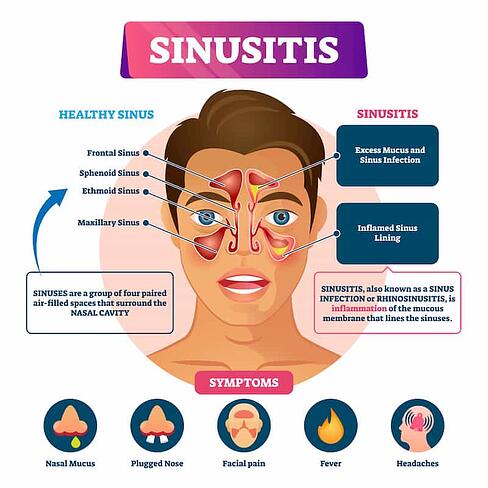
Sinusitis is a common inflammation of the paranasal sinuses, the cavities that produce the mucus necessary for the nasal passages to work effectively. If the Sinus Passages become blocked and filled with fluid, germs can grow and cause an infection.
Conditions that can cause sinus blockage include;
- The common cold
- Allergic rhinitis, which is swelling of the lining of the nose
- Small growths in the lining of the nose called nasal polyps
- A deviated septum, which is a shift in the nasal cavity
Types
Doctors may use different terms to describe the type of Sinusitis a patient has;
- Acute sinusitis usually starts with cold-like symptoms such as a runny, stuffy nose and facial pain. It may start suddenly and last 2-4 weeks.
- Subacute sinus inflammation usually lasts 4 to 12 weeks
- Chronic inflammation symptoms last 12 weeks or longer
- Recurrent sinusitis happens several times a year
Symptoms
Common signs and symptoms of chronic sinusitis include:
- Nasal inflammation
- Thick, discolored discharge from the nose
- Drainage down the back of the throat (postnasal drainage)
- Nasal obstruction or congestion, causing difficulty breathing through the nose
- Pain, tenderness and swelling around the eyes, cheeks, nose or forehead
- Reduced sense of smell and taste
Other signs and symptoms can include;
- Ear pain
- Aching in the upper jaw and teeth
- Cough or throat clearing
- Sore throat
- Bad breath
- Fatigue
Chronic sinusitis and acute sinusitis have similar signs and symptoms, but acute sinusitis is a temporary infection of the sinuses often associated with a cold. The signs and symptoms of chronic sinusitis last at least 12 weeks, but the patient may have several episodes of acute sinusitis before developing chronic sinusitis.
Fever isn’t a common sign of chronic sinusitis, but a patient may have one with acute sinusitis.
Causes
Sinusitis can stem from various factors, but it always results from fluid becoming trapped in the sinuses. This fuels the growth of germs.
- Viruses: in adults, 90 percent cases of sinusitis result from a virus.
- Bacteria: in adults, 1 case in 10 is caused by bacteria
- Pollutants: chemicals or irritants in the air can trigger a buildup of mucus
- Fungi: the sinuses either react to fungi in the air, as in allergic fungal sinusitis (AFS), or they are invaded by fungi, as in chronic indolent sinusitis.
Diagnosis
The doctor will feel for tenderness in the nose and face and look inside the nose.
Methods for diagnosing chronic sinusitis include;
- Imaging tests – images taken using CT or MRI scan show details of the sinuses and nasal area. These might pinpoint a deep inflammation or physical obstruction that’s difficult to detect using an endoscope.
- Looking into the sinuses – a thin flexible tube with a fiber optic light inserted through the patient’s nose allows the doctor to see the inside of the sinuses.
- An allergy test – if the doctor suspects that allergies might be triggering the patient’s chronic sinusitis, they might recommend an allergy skin test. A skin test is safe and quick and can help detect what allergen is responsible for the nasal flare-ups.
- Samples from the nasal and sinus discharge (cultures) – cultures are generally unnecessary for diagnosing chronic sinusitis. However, when the condition fails to respond to treatment or is worsening, the doctor may swab inside the nose to collect samples that might help determine the cause, such as bacteria or fungi.
Treatments
The doctor will feel for tenderness in the nose and face and look inside the nose.
Methods for diagnosing chronic sinusitis include;
- Imaging tests – images taken using CT or MRI scan show details of the sinuses and nasal area. These might pinpoint a deep inflammation or physical obstruction that’s difficult to detect using an endoscope.
- Looking into the sinuses – a thin flexible tube with a fiber optic light inserted through the patient’s nose allows the doctor to see the inside of the sinuses.
- An allergy test – if the doctor suspects that allergies might be triggering the patient’s chronic sinusitis, they might recommend an allergy skin test. A skin test is safe and quick and can help detect what allergen is responsible for the nasal flare-ups.
- Samples from the nasal and sinus discharge (cultures) – cultures are generally unnecessary for diagnosing chronic sinusitis. However, when the condition fails to respond to treatment or is worsening, the doctor may swab inside the nose to collect samples that might help determine the cause, such as bacteria or fungi.
Treatments
If a patient has a simple sinus infection, the doctor may recommend the patient to use decongestant and saline nasal washes. Patients shouldn’t use an over-the-counter decongestant more than 3 days, though, because it can make them more congested.
Treatments for Chronic Sinusitis include;
- Nasal corticosteroids – these nasal sprays help prevent and treat inflammation. Examples include fluticasone, triamcinolone, budesonide, mometasone and beclomethasone. If the sprays aren’t effective enough, the doctor might recommend rinsing with a solution of saline mixed with drops of budesonide or using nasal mist of the solution.
- Saline nasal irrigation – with nasal sprays or solutions, reduces drainage and rinses away irritants and allergies.
- Oral or injected corticosteroids – these medications are used to relieve inflammation from severe sinusitis, especially if the patient also has nasal polyps. Oral corticosteroids can cause serious side effects when used long term, so they’re used only to treat severe symptoms.
- Aspirin Desensitization Treatment – if the patient has reactions to aspirin that cause sinusitis. Under medical supervision, the patient will gradually be given larger doses of aspirin to increase tolerance.
Antibiotics – Antibiotics are sometimes necessary for sinusitis if the patient has a bacterial infection.
Immunotherapy – If allergies are contributing to the sinusitis, allergy shots (immunotherapy) that help reduce the body’s reaction to specific allergens might improve the condition.
Surgery – In cases resistant to treatment or medication, endoscopic sinus surgery might be an option. For this procedure, the doctor uses a thin, flexible tube with an attached light (endoscope) to explore the sinus passages.
What We Offer
We at Almurshidi Medical Tourism will find the best doctors to cater to your needs. We are partnered with a wide network of hospitals and clinics that provide top quality medical experience.
We provide free medical estimates, make medical appointments, and provide several medical opinions if needed at no cost.
Contact Us
For more information contact us at +66822004040 or via WhatsApp





